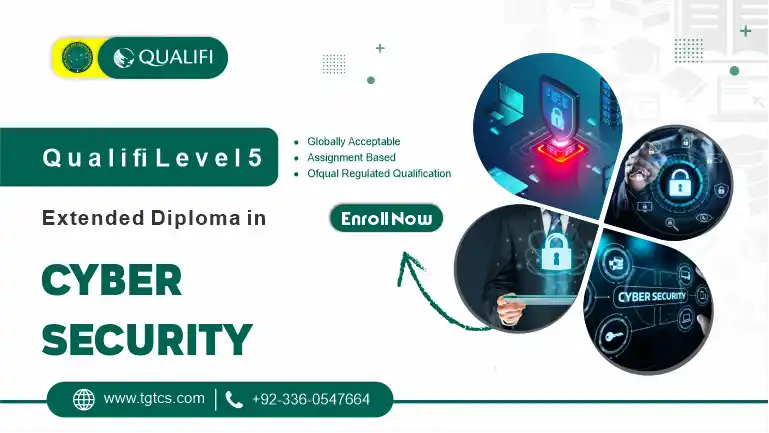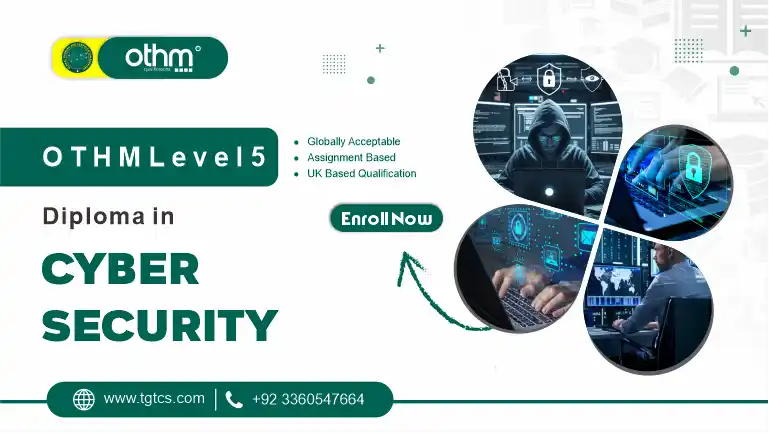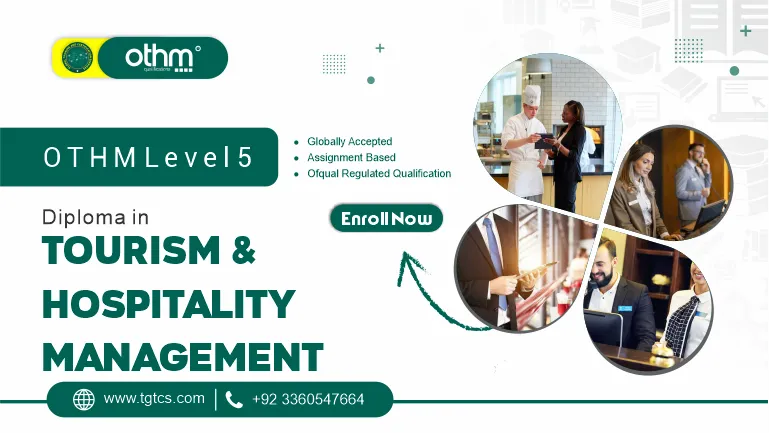Qualifi Level 5 Extended Diploma in Cyber Security
Take your career to new heights while enhancing workplace safety. Discover the art of fostering a secure and healthy work environment.
In an era where digital threats are becoming increasingly sophisticated, the demand for skilled cyber security professionals has never been higher.
The Qualifi Level 5 Extended Diploma in Cyber Security is a pivotal qualification designed to equip individuals with the advanced skills and knowledge required to protect sensitive information and systems from cyber threats. This diploma offers a comprehensive pathway into the dynamic and critical field of cyber security.
The Qualifi Level 5 Extended Diploma in Cyber Security is an advanced qualification that delves into the complex world of information security.
This course provides students with an in-depth understanding of cyber threats, security measures, and best practices for safeguarding digital assets.
It covers a broad spectrum of topics including network security, ethical hacking, threat detection, and risk management, preparing students to tackle the challenges faced by modern organizations in protecting their digital infrastructure.
The course emphasizes practical, hands-on learning. Students will engage in real-world simulations and projects that mimic actual cyber security challenges. This practical approach helps bridge the gap between theoretical knowledge and real-world application, ensuring that graduates are well-prepared to handle security threats effectively.
The increasing frequency and sophistication of cyber attacks make cyber security an essential and rapidly growing field. Organizations across all sectors are investing heavily in cyber security to protect their data, systems, and reputation.
By pursuing the Qualifi Level 5 Extended Diploma in Cyber Security, you position yourself at the forefront of this critical industry, equipped to tackle the evolving challenges of digital security.
The Qualifi Level 5 Extended Diploma in Cyber Security is more than just a qualification; it’s a gateway to a rewarding and impactful career in one of today’s most vital fields.
With a comprehensive curriculum, practical experience, and a range of career opportunities, this diploma provides the skills and knowledge needed to excel in the cyber security domain.
The Global Training and Certification Services (tgtcs) is Offering All Qualifi Certifications in Association with Inspire College of Technologies Uk (ICTQual).
The Qualifi Level 5 Extended Diploma in Cyber Security is an advanced qualification designed to provide comprehensive knowledge and practical skills in the field of information security.
This diploma covers critical areas such as network security, ethical hacking, threat detection, and risk management.
It combines theoretical learning with hands-on experience through real-world simulations and projects, preparing students to effectively protect digital assets and systems from cyber threats.
The course is ideal for those seeking to advance their careers in cyber security, offering flexible study options and a pathway to further education or specialized certifications.
Graduates are equipped with industry-relevant skills, enhancing their employ ability and readiness for roles such as Cyber Security Analyst, Ethical Hacker, and Information Security Manager.
Upon successful completion of the Qualifi Level 5 Extended Diploma in Cyber Security, students will be able to:
- Implement Network Security Measures: Design and apply effective security measures for network infrastructures, including configuring firewalls, intrusion detection systems (IDS), and virtual private networks (VPNs) to protect against unauthorized access and cyber threats.
- Conduct Ethical Hacking and Penetration Testing: Utilize ethical hacking techniques and tools to perform penetration testing, identify vulnerabilities in systems and applications, and recommend remediation strategies to enhance security.
- Analyze and Respond to Cyber Threats: Detect, analyze, and respond to various types of cyber threats and security incidents. Develop and execute incident response plans to mitigate and manage security breaches.
- Manage Cyber Security Risks: Assess and manage risks related to information security by conducting risk assessments, implementing risk management frameworks, and developing strategies to minimize potential impacts on organizational assets.
- Develop and Implement Security Policies: Create and enforce comprehensive cyber security policies and procedures, ensuring compliance with industry standards, regulations, and best practices such as GDPR and ISO 27001.
- Secure Information Systems: Apply principles and practices to safeguard information systems, including securing data storage, encryption methods, and access controls to protect sensitive information from unauthorized access.
- Understand and Apply Legal and Regulatory Requirements: Gain knowledge of legal and regulatory frameworks relevant to cyber security, and ensure that organizational practices comply with applicable laws and regulations to maintain security and privacy.
- Evaluate and Utilize Cyber Security Technologies: Assess and implement various cyber security technologies and tools, including anti-virus software, vulnerability scanners, and security information and event management (SIEM) systems, to enhance organizational security.
- Communicate Effectively in Security Contexts: Develop strong communication skills to effectively articulate security issues, solutions, and recommendations to stakeholders, including technical teams, management, and non-technical personnel.
- Apply Best Practices in Cyber Security: Stay updated with current trends, threats, and best practices in the cyber security field, applying this knowledge to continuously improve security measures and practices within an organization.
Mandatory Units
- Cyber Security Threat and Risk
- Network Security and Data Communications
- Database Security and Computer Programming
- Incident Response, Investigations and Forensics
- Security Strategy: Laws, Policies and Implementation
- Cyber Security Threats and Risk: Banking and Finance
- Cyber Wars
- Cryptography
- Digital Investigations and Forensics
- Communications and Incident Management
- Strategic Leadership
Benefits of the Qualifi Level 5 Extended Diploma in Cyber Security
- In-Depth Knowledge and Skills: Gain a comprehensive understanding of key cyber security concepts including network security, ethical hacking, risk management, and threat detection. This diploma provides you with the advanced skills necessary to address and mitigate various cyber threats effectively.
- Practical, Hands-On Experience: The course emphasizes practical learning through real-world simulations and projects. You will develop and implement security measures, conduct penetration tests, and manage security incidents, ensuring you have the hands-on experience to apply your knowledge in real-world scenarios.
- Career Advancement Opportunities: The diploma opens doors to a wide range of career opportunities in the cyber security field. Graduates are prepared for roles such as Cyber Security Analyst, Ethical Hacker, Network Security Specialist, and Information Security Manager, among others.
- Industry-Recognized Qualification: The Qualifi Level 5 Extended Diploma is recognized and respected within the cyber security industry. Holding this qualification enhances your credibility and employability, demonstrating your commitment and expertise to potential employers.
- Flexibility in Study: With options for full-time, part-time, and online study, the diploma offers flexibility to fit different schedules and learning preferences. This allows you to balance your studies with work or other commitments, making it accessible to a diverse range of learners.
- Foundation for Further Education: The diploma provides a solid foundation for pursuing higher qualifications. You can advance to the Qualifi Level 6 Diploma, enter the final year of a related undergraduate degree, or pursue specialized certifications such as Certified Information Systems Security Professional (CISSP) or Certified Ethical Hacker (CEH).
- Enhanced Employability: The skills and knowledge gained from the diploma are highly valued in the job market. Graduates are well-equipped to meet the growing demand for cyber security professionals and can leverage their expertise to secure rewarding positions in various sectors.
- Up-to-Date Industry Insights: Stay current with the latest trends, threats, and technologies in the cyber security field. The course curriculum is designed to reflect the evolving nature of cyber threats and best practices, ensuring you are knowledgeable about the most recent developments.
- Improved Problem-Solving Skills: Develop strong problem-solving abilities as you learn to identify, analyze, and address complex security issues. These skills are essential for effectively protecting digital assets and managing security incidents.
- Professional Development: Enhance your professional skills, including project management, risk assessment, and communication. The diploma helps you build a range of competencies that are crucial for career advancement and success in the cyber security industry.
The ideal learner for the Qualifi Level 5 Extended Diploma in Cyber Security is someone with a keen interest in the field of information security and a commitment to protecting digital systems from evolving threats. Here are the key characteristics and qualifications that define the ideal candidate:
- Interest in Cyber Security: A strong passion for cyber security and a desire to understand how to defend against and respond to cyber threats. This interest might stem from personal curiosity, academic pursuits, or professional experiences in related fields.
- Technical Aptitude: While prior experience in cyber security is not mandatory, a basic understanding of IT systems, networks, and general technology concepts is beneficial. Technical aptitude helps in grasping complex security concepts and tools effectively.
- Analytical Thinking: The ability to think critically and analyze complex data is crucial. The ideal learner should be capable of assessing security vulnerabilities, understanding threat patterns, and devising effective strategies to mitigate risks.
- Detail-Oriented Approach: Cyber security requires meticulous attention to detail. The ideal candidate should be thorough and precise in their work, as even small oversights can lead to significant security issues.
- Problem-Solving Skills: Strong problem-solving skills are essential for identifying and addressing security challenges. The learner should be adept at troubleshooting issues, developing solutions, and applying best practices to secure systems.
- Motivation and Self-Discipline: Given the flexible study options, including online learning, the learner should be self-motivated and disciplined. An ability to manage time effectively and stay focused on coursework is important for successful completion of the diploma.
- Communication Skills: Effective communication is key in cyber security roles. The learner should be able to articulate complex security concepts clearly to both technical and non-technical audiences, and collaborate effectively with team members and stakeholders.
- Career-Oriented: The ideal learner is focused on building a career in cyber security or enhancing their current expertise. They should be motivated by career advancement opportunities and be keen on applying their skills in professional settings.
- Adaptability: The field of cyber security is dynamic and constantly evolving. The ideal candidate should be adaptable, willing to learn about new technologies, and stay updated with the latest trends and threats in the cyber security landscape.
- Ethical Integrity: A strong sense of ethical responsibility is crucial in cyber security. The learner should understand the importance of maintaining high ethical standards when dealing with sensitive information and security practices.
Progression Routes
Progression Opportunities After Completing the Qualifi Level 5 Extended Diploma in Cyber Security
- Pursue a Level 6 University Degree (Top-Up): Upon successful application and acceptance by our partner institution, you can advance to a Level 6 University Degree (Top-Up) course. This opportunity allows you to complete a bachelor’s degree in your field, building upon the knowledge and skills gained from the Level 5 Diploma, and further enhancing your academic credentials and career prospects.
- Enter Directly into Employment: Alternatively, you can transition directly into the workforce, leveraging your Level 5 Diploma to secure a position in the cyber security industry. This qualification equips you with the practical skills and expertise needed for roles such as Cyber Security Analyst, Network Security Specialist, or Information Security Manager, allowing you to start or advance your career in a relevant profession immediately.
Course Overview
Course Level
Level 5
Course Units
11 mandatory Units
Duration
5 to 10 Months






